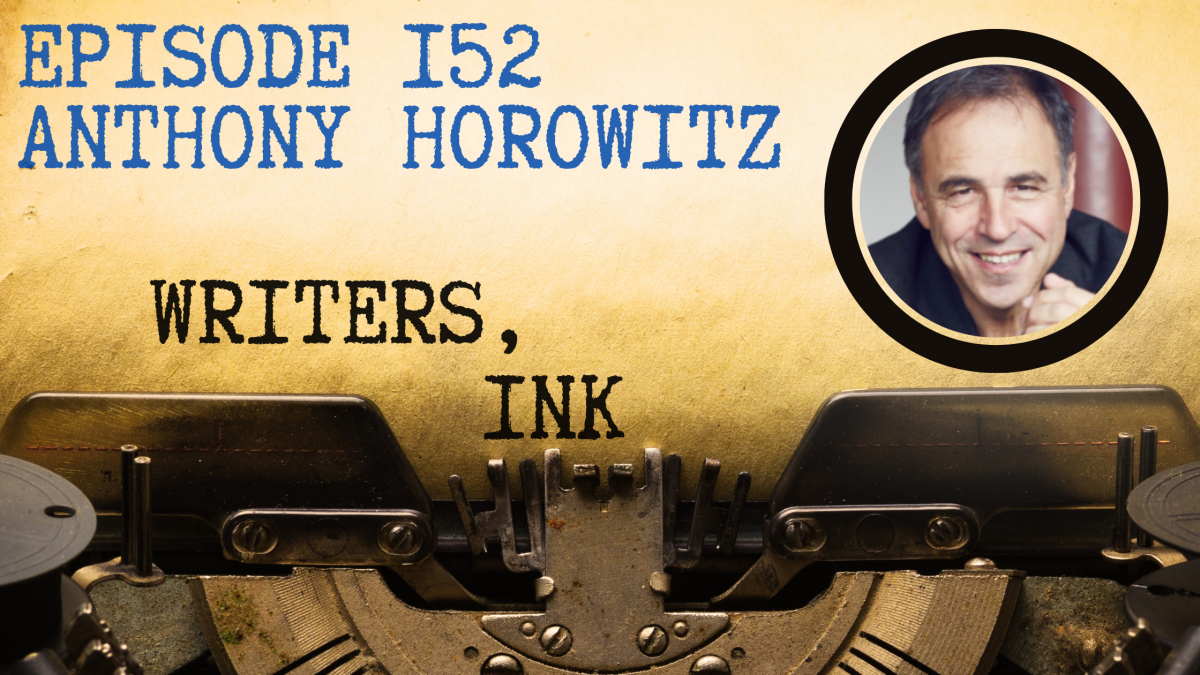

Anthony Horowitz knows the advantages and limitations of writing in a major franchise. In his latest James Bond novel, With a Mind to Kill, Horowitz uses his own brand of fast-paced dialogue and gripping storytelling to revitalize the Bond franchise while working within the confines of Ian Fleming’s original world. Anthony has written over 40 books, with his Alex Rider series selling more than 19 million copies. To purchase With a Mind to Kill, follow the link below.
From Amazon.com:
I have over forty-five published novels to my name. The game changer for me was Stormbreaker, the first Alex Rider adventure, published in 2000. There were eleven more books in the series – the latest, Never Say Die, was published in 2017 – and they are now being developed for TV. I have plenty of other children’s books out there – I was delighted to discover my Power of Five series (Raven’s Gate, Evil Star etc) on sale in a tiny bookshop in Elounda, Crete only a few days ago.
In this episode, you’ll discover:
- The differences between the Bond movies and books
- The challenges of writing in Fleming’s universe
- Why you should get hooked by your own writing
- Why Horowitz rejects routine
- His philosophy on collaboration
Links:
J. D. Barker – http://jdbarker.com/
J. Thorn – https://theauthorlife.com/
Zach Bohannon – https://zachbohannon.com/
Anthony Horowitz – https://anthonyhorowitz.com/
With a Mind to Kill – https://books2read.com/u/3J6VeK
Three Story Method: Writing Scenes – https://books2read.com/threestorymethodws
Best of BookTook – https://bestofbooktok.com/
Story Rubric – http://storyrubric.com
Nonfic Rubric – http://nonficrubric.com
Scene Rubric – http://scenerubric.com
Proudly sponsored by Kobo Writing Life – https://kobowritinglife.com/ and Atticus – https://www.atticus.io/
Music by Nicorus – https://cctrax.com/nicorus/dust-to-dust-ep
Voice Over by Rick Ganley – http://www.nhpr.com and recorded at Mill Pond Studio – http://www.millpondstudio.com
Audio production by Geoff Emberlyn – http://www.emberletter.com/
Contact – https://writersinkpodcast.com/contact/
*Full disclosure: Some of the links are affiliate links.





Christopher Wills
3 years ago
Fascinating interview. I have read and watched a lot of Anthony Horowitz’s output over the years. My son read most of the Alex Rider books when younger. I love the fact that he writes any time, any place and has no routine. He gets on and writes. And I agree reading is a very important social mobility skill, sadly lacking by some parts of society, and I love his passion for this topic.
Main takeaway today, which I share, is his pleasure of reading and writing.
You asked the writer ‘born v made’ question. I think nobody is born a writer. Anthony’s Wiki page says he knew he wanted to be a writer from age 8, he has read prolifically all his life, he went to one of the top schools in UK (Rugby School – you will never guess what sport was invented at that school…) and he studied English Literature at university. So he was made, but made over many years of devotion and passion.
Some writers today think of writing as a business rather than a passion which is a shame because some don’t read much, if at all. Reading has to be a requirement to become a good writer, one cannot learn and absorb important writing skills from a TV screen.
Great show today.
J. Thorn
3 years ago
I had a feeling you’d like this episode 😉
S. A. Schneider
3 years ago
Loved this in so many regards. I used to go to the big Goodwill in Akron and ended up collecting all of the Dover press James Bond books. Always loved those. And I’ve got most of the Gardner Bond books, but didn’t realize how many more James Bond series there are beyond Fleming!
Horowitz describing writing as immersion, like he’s in the world, is totally how I am with writing. The times I get the most interesting writing is when I can block out any other thoughts and just pull back the curtain to peek into the other world. When I talk to kids, that’s how I describe it.
And JD, I’m with you. I’ve been doing a talk trying to open parents/teachers eyes that learning story is something their kids can do NOW! They don’t need to wait until after college to write and get the experience. In fact, if they are interested in being a narrative designer in video games, the experience is more important than the degree. Start in 5th grade, write some stories and work on a video game or 2 and get that experience. And I also show them they don’t need programming to create a video game, so there’s no reason to wait.
And Zach – yes, kids need to read much more. So what does school do? What you guys talked about – they force kids to read 200 year old books that they can’t relate to and don’t find enjoyable and then we wonder why kids (and adults) don’t want to read. Give them books they want to read and get them reading. Then, maybe, they’ll read Pride and Prejudice. Though, I’ve read hundreds or thousands of books and have never read Pride and Prejudice and don’t feel like my life isn’t complete.
Jeff Strand posted a review from a teacher. She was so ecstatic that his books got her kids (especially boys) interested in reading and asking for more to read. That should be our goal and not that they have to read some old books they don’t like JUST because that’s how it’s been for decades.
J. Thorn
3 years ago
Thanks, buddy. Going to really go out on a limb here, but I hated PRIDE AND PREJUDICE. Can’t understand how its considered a masterpiece.